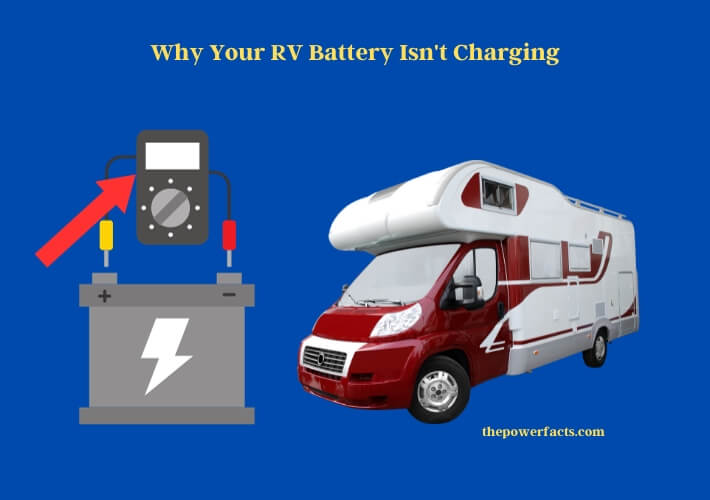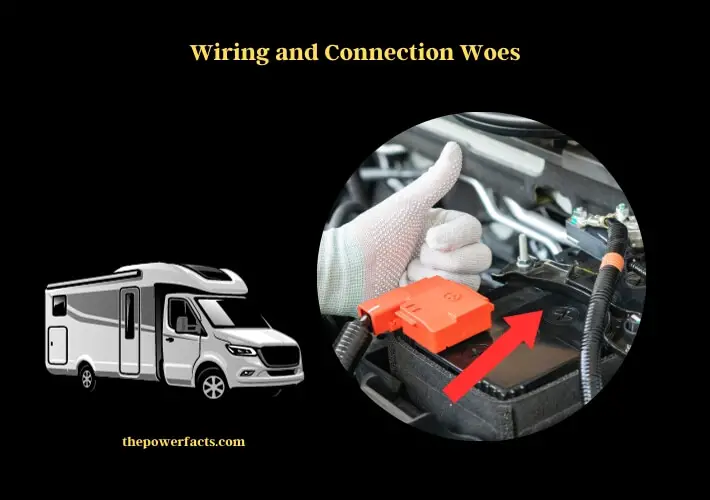Your RV battery might not be charging due to a range of issues including a malfunctioning alternator, a faulty converter, or problems with the charging system wiring and connections. It could also be due to a depleted battery that is no longer able to hold a charge.
Driving your camper can often recharge the battery, but if this isn’t happening, the alternator or the wiring that connects it to the battery could be at fault. Similarly, if the battery isn’t charging while connected to shore power, it’s often a sign that the converter, responsible for transforming AC power to DC to charge the battery, is malfunctioning or has failed. You can identify a faulty converter by checking if it’s overheating, making unusual noises, or if the RV lights are flickering.
RV batteries might also face charging issues when powered by a generator. Ensuring the generator is in good working condition and the connections to the battery are secure can often resolve this issue. For owners of Forest River RVs, it’s not uncommon to face battery charging issues, and consulting the specific model’s manual or seeking professional help can offer solutions.

Understanding the RV battery charging system diagram can be instrumental in troubleshooting. It outlines the connections and components involved in charging the battery, making it easier to identify and fix any issues. Regular maintenance, inspection of wiring, and timely replacement of worn-out parts can mitigate the risk of the RV battery not charging, ensuring a hassle-free experience during your travels.
Identifying the Issue
Symptoms of a Non-Charging RV Battery
Ever been in a situation where you’re ready to hit the road, and bam, your RV battery decides to give up on you? It’s not uncommon. Dimming lights, weak appliance operation, and the need for frequent jump starts are clear indicators that your RV battery is not charging. It’s like having a flashlight that flickers just when you need it the most. So, what do you do? Panic, call for help, or become your own RV battery detective?
Tools for Diagnosing Battery Problems
Arming yourself with a multimeter and knowledge on visual inspection techniques is akin to a doctor having a stethoscope. A multimeter is your go-to gadget to check the voltage levels, while your eyes are the best tools to spot any obvious signs of wear and tear. It’s not about being a professional electrician, but about knowing your RV inside out, just like you know the back of your hand.
Alternator Challenges
Signs of a Failing Alternator
Warning lights flashing on the dashboard, unusual noises, and electrical failures are like the RV’s way of crying for help. It’s telling you the alternator, its powerhouse, is on the fritz. It’s akin to the heart pumping blood around the body, but in this case, it’s energy flowing through the RV. If the heart is weak, the energy flow is disrupted. Can you afford to ignore these signs?
Replacing or Repairing the Alternator
Imagine this: you’re in the middle of nowhere, and your RV’s alternator decides to take a permanent break. Nightmare, right? Knowing the step-by-step replacement process and the costs associated can be your lifesaver. It’s like having a spare tire; you hope you never need it, but you’re grateful it’s there when you do. Are you prepared for the unexpected?
Converter Complications
Common Converter Issues
Ever noticed your RV lights flickering or the converter overheating? It’s as frustrating as having a cell phone that’s constantly dying. Inadequate power output is often the silent culprit lurking in the background. It’s not something you can turn a blind eye to, is it? It’s like having a leaky faucet; annoying and demanding immediate attention.
Effective Solutions for Converter Problems
Knowing your repair options and replacement models is like having an ace up your sleeve. It’s not just about fixing an issue; it’s about upgrading your RV’s performance. It’s akin to swapping out an old, sluggish phone for the latest model. Who doesn’t relish the thrill of an upgrade, the enhanced performance, and the eradication of persistent, nagging issues?
Wiring and Connection Woes
Spotting Wiring Issues
Visual signs of damage and electrical tests are your allies in spotting wiring issues. It’s akin to finding cracks in the foundation of your home. Ignoring them won’t make them disappear, right? Addressing these issues head-on is not just necessary; it’s critical. It’s like patching up those cracks before your entire house crumbles. Ready to face the challenge?
Common Wiring Problems and Solutions
| Issue | Solution |
| Frayed wires | Replacement or repair |
| Loose connections | Tightening or replacing connectors |

Maintenance and Prevention
Routine Inspection Protocols
Think of battery health checks and electrical system inspections like your annual health check-ups. They’re not optional; they’re essential. It’s about catching issues before they balloon into major problems. It’s akin to spotting a small leak before it turns into a flood. Who wouldn’t want to nip problems in the bud and enjoy seamless journeys?
Preventative Measures
Regular cleaning and timely replacements are not chores but necessities. It’s like brushing your teeth; you can’t skip it just because you’re not in the mood. It’s about ensuring that every journey is as smooth as the last. Can you imagine the peace of mind that comes with knowing your RV is in tip-top shape, ready to take on any adventure?
Case Study: Forest River Battery Not Charging
Identifying Unique Issues
Every Forest River RV model is a unique beast with its own set of quirks. It’s like having a pet with a distinct personality. Knowing the model-specific problems and manufacturer’s guidelines is not a luxury; it’s a necessity. It’s akin to knowing exactly how to groom your pet to keep them happy and healthy. Are you ready to become an expert in your RV’s unique needs?
Forest River Model-Specific Solutions
| Model | Solution |
| XYZ | Replace converter |
| ABC | Upgrade wiring system |
Frequently Asked Questions (FAQs)
What Are the Common Symptoms of a Non-Charging RV Battery?
When your RV battery isn’t charging, you might notice several signs. Dimming lights, weak operation of appliances, and the need for frequent jump starts are clear indicators. It’s similar to how your smartphone behaves when it’s running out of juice. If you’re experiencing these issues, it’s time to investigate the root cause.
How Can I Diagnose Battery Charging Problems?
Equip yourself with a multimeter to check voltage levels. A visual inspection can also reveal obvious signs of wear and tear. For instance, if you see corroded terminals or damaged wires, those could be culprits. Think of it as doing a health check-up for your RV’s electrical system.
What Might Cause My RV’s Alternator to Fail?
The alternator is crucial for charging the battery. Signs of its failure include warning lights on the dashboard, unusual noises, and other electrical failures. It’s like the heart of your RV’s electrical system. If it’s not working properly, the battery won’t charge as it should.
Are the Solutions for Milwaukee M18 Battery Charge Issues Applicable to RV Batteries as Well?
When faced with battery charge issues in Milwaukee M18 or RV batteries, finding suitable solutions is crucial. While fixes for m18 battery charge issues may offer useful tips for Milwaukee M18 batteries, it’s wise to remember that RV batteries differ in specifications and usage. Consulting specific resources for RV battery troubleshooting is recommended.
Why Is My Converter Overheating?
Converters can overheat due to various reasons. It might be due to a malfunctioning fan, a faulty circuit, or even an overloaded system. An overheating converter can’t efficiently transform AC power to DC, which is essential for charging the RV battery. It’s akin to running a marathon with a heavy backpack; the performance is bound to be affected.
How Do Wiring Issues Affect Battery Charging?
Damaged or frayed wires, as well as loose connections, can disrupt the flow of electricity. It’s like having a kinked hose; the water flow is restricted. Similarly, if the electrical flow is hampered, the battery won’t charge efficiently. Regular inspections can help spot and rectify these issues.
Are There Specific Issues with Forest River RV Batteries?
Each RV model, including those from Forest River, has its unique set of quirks. Some might have model-specific problems that affect battery charging. It’s essential to refer to the manufacturer’s guidelines or consult with other owners of the same model to pinpoint any unique challenges.
How Can Regular Maintenance Prevent Charging Issues?
Think of regular maintenance as the routine care you’d give to a prized possession. By routinely checking the battery’s health, inspecting the electrical system, and ensuring all components are in good shape, you can prevent many common issues. It’s like going for regular health check-ups; you catch potential problems before they become major concerns.
Navigating through the maze of RV battery issues can be daunting, but with the right knowledge, it’s a walk in the park. Identifying the symptoms, knowing the role of the alternator and converter, and understanding wiring issues are key. It’s like having a roadmap in a foreign city. With model-specific insights for Forest River RV owners and a strong emphasis on regular maintenance, every RV owner is armed to ensure their vehicle is always ready to hit the road. Ready to turn every journey into a memorable adventure?